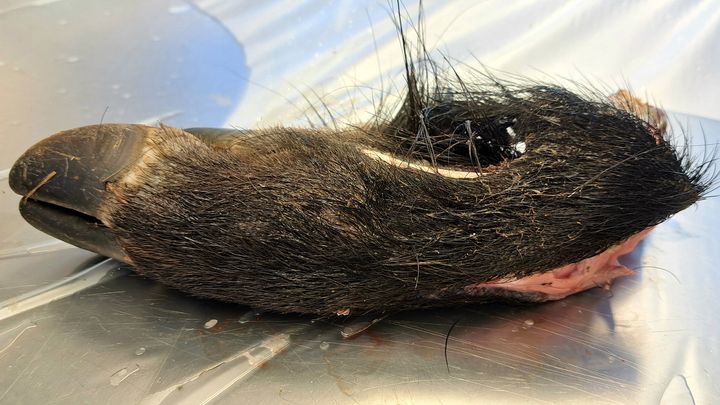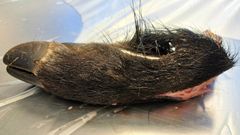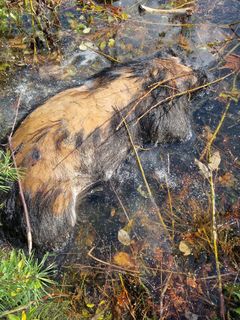African swine fever in wild boar outside Fagersta, Sweden
African swine fever virus has today been detected in a sample from a dead wild boar found just southeast of Fagersta in the county of Västmanland, 145 km northwest of Stockholm in Sweden. African swine fever is a serious viral disease that affects wild boar and pigs, but does not affect humans or other animal species. It is currently not clear how the infection came to Sweden.

Since August 25, seven wild boars have been found dead in a limited area in the Fagersta area. Samples from another wild boar are on their way to SVA. Relevant authorities are now working intensively to localize, contain and control the infection. More information will be provided on an ongoing basis.
- The contingency plan we have had for a long time is now being implemented. We are also taking note of experiences from other countries that have been in a similar situation," says Lena Hellqvist Björnerot of the Swedish Board of Agriculture.
Mapping in progress
One of the first measures will be for the responsible authorities to work with the hunters' organizations to find out how large an area is affected. This is done by searching for dead wild boar in combination with knowledge of the wild boars’ home range. Within the affected area, all access will initially be prohibited. This means, for example, that you may not be in the area, pick berries and mushrooms, hunt, work with forestry, or do other outdoor activities. The infection does not affect humans or other animal species, but it can be spread via pig meat or by carrying the virus on shoes, tools and vehicles.
- At present, we do not know how the infection was introduced but it is a long-distance jump from the nearest infected area in Europe and we therefore assume that it has been introduced through human activity and not wild boar. There is currently an extensive spread of infection in Europe. There are countries that have succeeded in eradicating the disease and that is our national goal," says Karl Ståhl at SVA.
Members of the public and hunters throughout Sweden, but especially in the area in question and in Västmanland, are now encouraged to report findings of dead wild boar to SVA via www.rapporteravilt.sva.se.
Pig owners are encouraged to review their biosecurity and contact a veterinarian if there are signs of disease or increased mortality.
Facts:
African swine fever is a contagious viral disease that affects European wild boar and pigs with severe clinical disease including fever, bleeding, loss of coordination (ataxia), poor appetite and death usually occurs within a week.
The disease does not affect humans.
The disease has been present in Europe since 2007 and the EU since 2014.
Since its introduction to the EU, the disease has spread continuously in the wild boar population at a rate of about 1-2 km per month and in addition, several jumps in the spread of the disease have occurred where the disease suddenly appeared far (several hundred kilometres) from previously infected wild boar populations or in pig herds. The disease is now present in wild boar and domestic pigs in several countries in central, eastern and southern Europe. More about this can be read in SVA's latest situation report Epidemiological situation report: African swine fever August 23, 2023 (sva.se) Infected pigs and wild boar have virus in all parts of the body with the highest virus levels in blood. The infection can be spread by direct contact between infected and healthy pigs and indirectly by contaminated materials, people, vehicles and feed. In raw and frozen meat, viruses can survive for a long time (months).
Within the EU, there are regulations on how the disease is managed in both domestic pigs and wild boar. For example, it is not allowed to feed domestic pigs or to feed wild boar with uncooked food waste or animal protein.
Nyckelord
Kontakter
Karl StåhlStatsepizootolog
Tel:018-67 41 27karl.stahl@sva.seErika ChenaisForskare, Epidemiolog
Tel:018-67 46 15erika.chenais@sva.seBilder


Friska djur – trygga människor. Statens veterinärmedicinska anstalt, SVA, är en expertmyndighet med beredskapsuppdrag. SVA främjar djurs och människors hälsa, svensk djurhållning och vår miljö genom diagnostik, forskning, beredskap och rådgivning. www.sva.se - http://www.sva.se
Följ Statens veterinärmedicinska anstalt
Abonnera på våra pressmeddelanden. Endast mejladress behövs och den används bara här. Du kan avanmäla dig när som helst.
Senaste pressmeddelandena från Statens veterinärmedicinska anstalt
Ny fästingart upptäckt i Sverige27.6.2024 06:50:00 CEST | Pressmeddelande
Under förra årets insamling till Rapportera Fästing rapporterade allmänheten in ett tiotal fästingar som vanligtvis inte påträffas i Sverige. Dessa har nu analyserats och Statens veterinärmedicinska anstalt (SVA) kan konstatera att en ny fästingart – Dermacentor marginatus – har upptäckts för första gången i Sverige.
Mer underlag behövs för övervakningen av antibiotikaresistens26.6.2024 09:00:00 CEST | Pressmeddelande
SVA övervakar förbrukning av antibiotika och antibiotikaresistens hos bakterier bland svenska djur. Läget är generellt sett stabilt och bra, men fortsatt arbete krävs för att det ska förbli så. Dessutom krävs mer provunderlag för att kunna upprätthålla en tillförlitlig övervakning. Det är några av slutsatserna i Swedres-Svarm 2023, en rapport som SVA ger ut gemensamt med Folkhälsomyndigheten.
Smittläget för djursjukdomar och zoonoser 2023 – SVA publicerar rapport24.6.2024 06:50:00 CEST | Pressmeddelande
Varje år sammanställer Statens veterinärmedicinska anstalt, SVA, en rapport över djursjukdomar och zoonoser i Sverige. Under 2023 sticker utbrottet av afrikansk svinpest (ASF) ut, en sjukdom som kunde fått allvarliga konsekvenser för grisnäringen och Sveriges livsmedelsberedskap.
Forskare behöver allmänhetens hjälp för att undersöka hälsa och dödsorsaker hos tumlare17.5.2024 07:55:00 CEST | Pressmeddelande
Inför tumlarens dag söndag 22 maj lyfter SVA och Naturhistoriska riksmuseet behovet av allmänhetens hjälp för att undersöka hälsa och dödsorsaker hos marina däggdjur. Tumlarna är hotade och varje fynd som rapporteras behövs.
Prover från sjuka rådjur efterlyses3.5.2024 06:50:00 CEST | Pressmeddelande
Statens veterinärmedicinska anstalt, SVA, driver ett forskningsprojekt för att ta reda på om rådjur kan sprida parasiten kryptosporidier till människor via grönsaker. I ett första led undersöker SVA om rådjur med diarré har drabbats av kryptosporidier som de kan sprida vidare.
I vårt pressrum kan du läsa de senaste pressmeddelandena, få tillgång till pressmaterial och hitta kontaktinformation.
Besök vårt pressrum